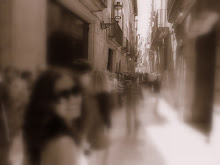Almanya - Welcome to Germany, is a 2011 German comedy directed by Yasemin Samdereli.
The movie starts with Canan, a young woman, describing her extended family, and how all of them are having problems. She is dealing with an unexpected pregnancy, with a non-Turkish boyfriend her family knows nothing about. Cenk, her cousin, can't be placed in his school's place of origin map as the map shows only Europe, stopping at Istanbul...and his grandfather is from Anatolia, in eastern Turkey. From where Huseyin Yilmaz came to Germany, leaving his wife and two sons and his baby daughter behind, in search of better paying work.
Their immigration story is told really well, serving to distract Cenk at various points in the movie: while the family meets for a meal and the grandfather, upset about his newly acquired German citizenship, announces his intention to take them all to Turkey for a vacation, and on their way to this holiday with the whole family. The backstory narration by Canan interacts with Cenk, for instance when he doesn't understand when people speak Turkish and he asks, can everyone please speak in German, and the scene moves forward with Turkish villages speaking German.
Cenk's dad was the first German in their family, and his wife is German. During the family meeting when Cenk wants to know if he is German or Turkish, as he can't play in both football teams, he needs to pick one, his mom says "German" at the same time as his dad responds with "Turkish".
The culture-clash, the un-belongingness in either country after you live away for a while, the confusion, identity crisis and longing on the grandfather's face, the happiness on the grandmother's face when she receives her German passport are only too well understood by scores around the world that move in search of a better life for themselves and their families.
However, this is a story that ends in tragedy. The million and oneth worker in Germany dies before he can give his speech in front of Chancellor Angela Merkel. So Cenk, his grandson gives it, making his entire family proud, and tells the audience that his grandfather wanted to say that he was happy.
The speech ends with a saying which is incredibly profound and so very true:
A wise man once gave an answer to the question of who or what we are.
We are the sum of everything which has happened before us,
everything that has happened under our eyes, everything that has happened to us.
We are everyone and everything that has influenced us, or that we have influenced.
We are everything which happens after we no longer exist,
and everything which would not have happened, had we not existed.
All in all, a movie you will not regret watching. If you are wondering: Cenk brings a map of Turkey to his class, and finds out something about his friend.
***
PS: If you are having trouble finding English subtitles for the movie, leave me a comment.
The movie starts with Canan, a young woman, describing her extended family, and how all of them are having problems. She is dealing with an unexpected pregnancy, with a non-Turkish boyfriend her family knows nothing about. Cenk, her cousin, can't be placed in his school's place of origin map as the map shows only Europe, stopping at Istanbul...and his grandfather is from Anatolia, in eastern Turkey. From where Huseyin Yilmaz came to Germany, leaving his wife and two sons and his baby daughter behind, in search of better paying work.
Their immigration story is told really well, serving to distract Cenk at various points in the movie: while the family meets for a meal and the grandfather, upset about his newly acquired German citizenship, announces his intention to take them all to Turkey for a vacation, and on their way to this holiday with the whole family. The backstory narration by Canan interacts with Cenk, for instance when he doesn't understand when people speak Turkish and he asks, can everyone please speak in German, and the scene moves forward with Turkish villages speaking German.
Cenk's dad was the first German in their family, and his wife is German. During the family meeting when Cenk wants to know if he is German or Turkish, as he can't play in both football teams, he needs to pick one, his mom says "German" at the same time as his dad responds with "Turkish".
The culture-clash, the un-belongingness in either country after you live away for a while, the confusion, identity crisis and longing on the grandfather's face, the happiness on the grandmother's face when she receives her German passport are only too well understood by scores around the world that move in search of a better life for themselves and their families.
However, this is a story that ends in tragedy. The million and oneth worker in Germany dies before he can give his speech in front of Chancellor Angela Merkel. So Cenk, his grandson gives it, making his entire family proud, and tells the audience that his grandfather wanted to say that he was happy.
The speech ends with a saying which is incredibly profound and so very true:
A wise man once gave an answer to the question of who or what we are.
We are the sum of everything which has happened before us,
everything that has happened under our eyes, everything that has happened to us.
We are everyone and everything that has influenced us, or that we have influenced.
We are everything which happens after we no longer exist,
and everything which would not have happened, had we not existed.
All in all, a movie you will not regret watching. If you are wondering: Cenk brings a map of Turkey to his class, and finds out something about his friend.
***
PS: If you are having trouble finding English subtitles for the movie, leave me a comment.





















